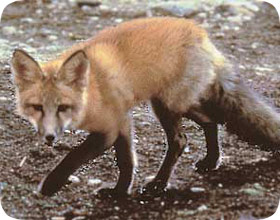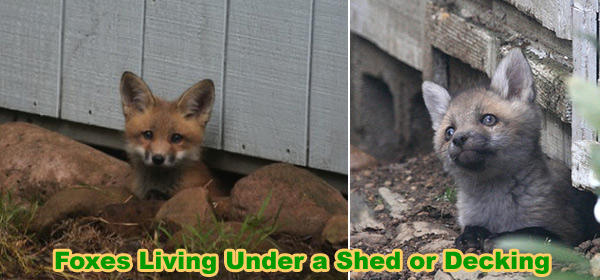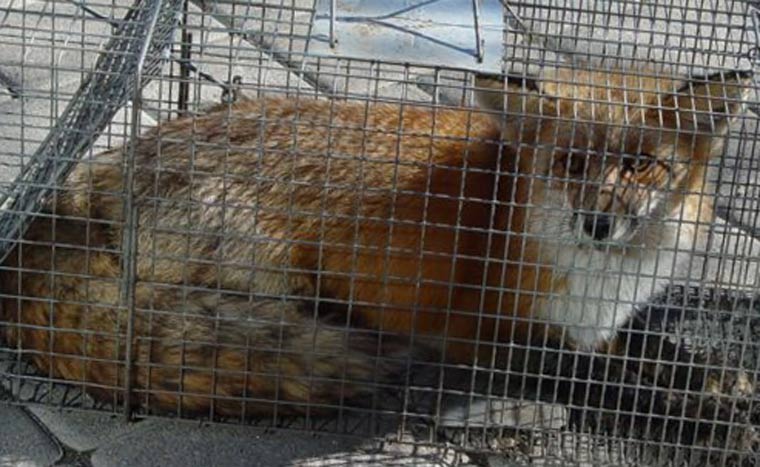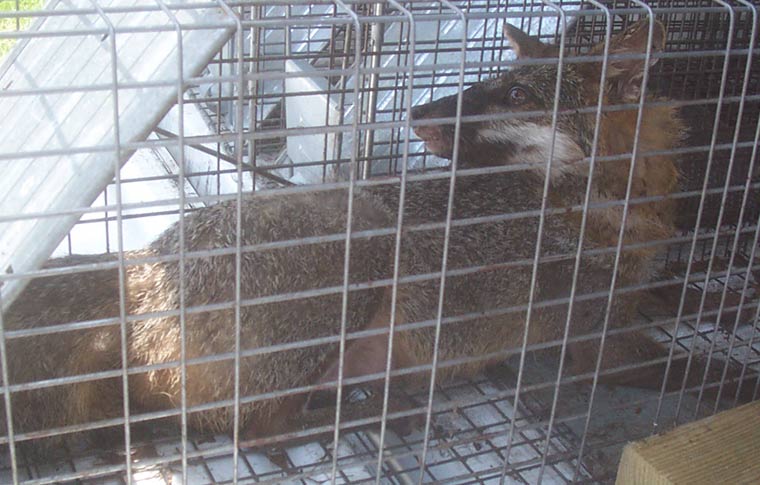- info@wildlife-removal.com
Call us for help in your town
Wildlife Removal Education
Are Fox Dangerous to People or Pets?
Need fox removal in your hometown? We service over 500 USA locations! Click here to hire us in your town and check prices - updated for year 2020.
 Many people consider the fox a dangerous animal. I know, because I get a lot of concerned phone calls and emails from people who are
worried that a fox is going to cause some harm to them. These are the three most common concerns that people call me regarding:
Many people consider the fox a dangerous animal. I know, because I get a lot of concerned phone calls and emails from people who are
worried that a fox is going to cause some harm to them. These are the three most common concerns that people call me regarding:
- Fox posing threat to pet
- Fox posing threat to small children
- Fox looking sick or rabid
Are Foxes Dangerous To People Or Pets?
A lot of people will be intimidated by the sight of a fox. It is true that to see a fox in a place where people live is a strange sight and no one should ever try to pet or corner a fox in order to catch it with their bare hands as they will become aggressive when cornered. But in general, foxes are not especially dangerous to humans or some pets. They will feed on livestock that is small such as poultry, rabbits or other small newborn animals. There have been cases where there have been some attacks, but generally speaking it is not a common occurrence. The cases where there has been an attack have happened when the fox is defending itself, its den or has been pushed to that extreme due to a lack of food. The reason they do not attack dogs, cats or humans is because they are not something that a fox sees as prey. Though it could happen that a fox tries to attack a dog or more likely a cat, they will be scared off when the noise begins or when a cat’s claws come out.
Diseases They May Carry
The one danger that foxes do present is the danger of disease. They are a possible carrier of rabies and a bite can cause an infection. They can also defecate close to where people live and the bacteria can spread when the feces dry or when a dog gets too close. This has the same impact as dog feces and if a fox has gone to the bathroom in your garden you should clean it, just like you would when a dog does it. The more likely scenario is that you will not be affected by the diseases that foxes carry, but your pets will be more susceptible to them. Mange, for example can affect dogs but the disease is easily treated and will not kill the dog once the treatment begins. The worst case scenario is hair loss by your pet unless it is not treated. Read Diseases Foxes Carry and Their Symptoms.
Danger To Humans
There have been some reported cases when a fox has attacked small children, but in reality there are not that many situations where that happens. In some cases the fox is acting territorial, and in some it may be defending itself. Attacks on humans are very rare, but unfortunately they do get a lot of press and that gives foxes a bad name. The fact is that foxes are very careful at what they do and while it can happen that they go into a house by accident, they will look for the exit as soon as they realize that there are people inside. There have been times when a fox has been credited with an attack, but in reality the culprit has been another animal. There is no reason to fear a physical attack from a fox on a human. Even in cases where a human may be close to its den, a fox will try to guide the person away by escaping.
Keep Them Away
Even though the fox does not represent an immediate danger you should not want them close to you. There is the possibility of the previously mentioned disease, not to mention the mess they can make around your home. Foxes are scavengers and if there is an easy meal to be had in your garbage then they will go for it. While there is not much to fear from foxes you should always approach with caution and if you are one of those rare cases where a fox actually goes into a house then you are better off calling wildlife control. There is a myth that foxes are dangerous to humans, but the truth is that foxes have a lot more to fear from us that we ever will from them.

For more information, go to may main fox removal page or read the guide about foxes.
Are Foxes Dangerous to Pets or Farm Animals?
In a word, yes, a fox is a danger to pets or farm animals. It’s not always just for the physical attacks, although these do happen much more frequently than you’d think. Chickens within a coop are one of the hardest-hit areas, and a coop that has not been adequately protected from the wrath of a passing fox will, without a shadow of a doubt, be hit before long.

As well as attacking chickens, foxes eat a wide variety of other animals, which can actually be the reason they are on your property in the first place. Chickens will lure them in, as well other livestock. They'll eat rodents — mice and rats — and a rodent infestation WILL encourage bigger, other predators to come by and check your place out. Many wild creatures have a remarkable sense of smell, and it won't be long before they've picked up on the stench of these nuisance wild critters.
Foxes will also prey on rabbits, and that includes wild rabbits and the pet ones that you have in a hutch in your back yard. If that hutch isn't secure, the fox will get in, and then you will need to explain to your children where poor Mr Floppy-Pops has gone.
In fact, this creature is so versatile and adaptable, it can eat a wide range of foods, animals and plant matter included. They’ll often switch things up to work with the area they’re in, eating berries, fruits, seeds, nuts, acorns, tubers, hedges, and more. If they find themselves close to water, they’ll change things up once again, eating frogs and small fish (if they’re fast enough to catch them), and also crabs too. Eggs left by other animals and birds will be snapped up, another reason why these foxes are not good to have around your coops, and they will even eat the dead carcasses of other animals left behind. Some foxes will become road kill themselves, in the attempt to get to road kill.
Beetles, caterpillars, moths, mushrooms, reptiles, cat and dog food, bird seed feeder, leftover roast chicken in your trash can …
Your garbage can will bring the fox in closer, and then they’ll stick around or keep coming back if they think they have easy access to it. If they happen to come across your cat or dog during those travels, there is a chance that conflict will arise. Bigger dogs probably won't have too much of a problem scaring the intruder away, but smaller dogs and cats can become the victim quite easily. Foxes can also carry rabies, and if those animals have not been vaccinated against the disease (and the number is higher than you'd think)
Are foxes a danger to humans?
Despite their cute and fluffy exterior, bouncing around on the kids’ trampolines and eating food in an utterly adorable fashion on social media, foxes are actually quite dangerous creatures. They carry diseases, including rabies. They also bring parasites, and they come with their fair share of diseases too. They leave a mess in the form of dug-up gardens, tipped over garbage cans, and piles of feces and urine. Again, the waste matter left behind carries with it the threat of disease. It also has a nasty habit of attracting other wildlife too, as well as insects. Again, many of those will come with additional disease threats. Read the guide How to Tell if an Active Fox is Sick or Rabid.

Diseases aside, foxes are also dangerous to humans in terms of actual, physical attacks. Although rare, foxes are becoming increasingly braver among people, and when animals don’t show or experience fear towards us, they’re dangerous towards us. It starts by the fox getting snappy when you stop feeding it the tit bits left over from your picnic. It wants more food, and it's not the only animal that has started to act in this way towards us. Raccoons are the same, and squirrels have been tamed enough to take food out of human hands, especially in London, UK.
All wild animals have the potential to be dangerous to humans, especially as far as the threat of disease is concerned. Foxes are no different, and in some ways, they’re actually worse. We’re inviting these creatures into our back yards, and sometimes even into our homes, which means we’re inviting all of those diseases, parasites, and insects in with them. Read more about Are Foxes Good Pets? and What is the Fox's Habitat?
Go back to the Fox Removal page.


















